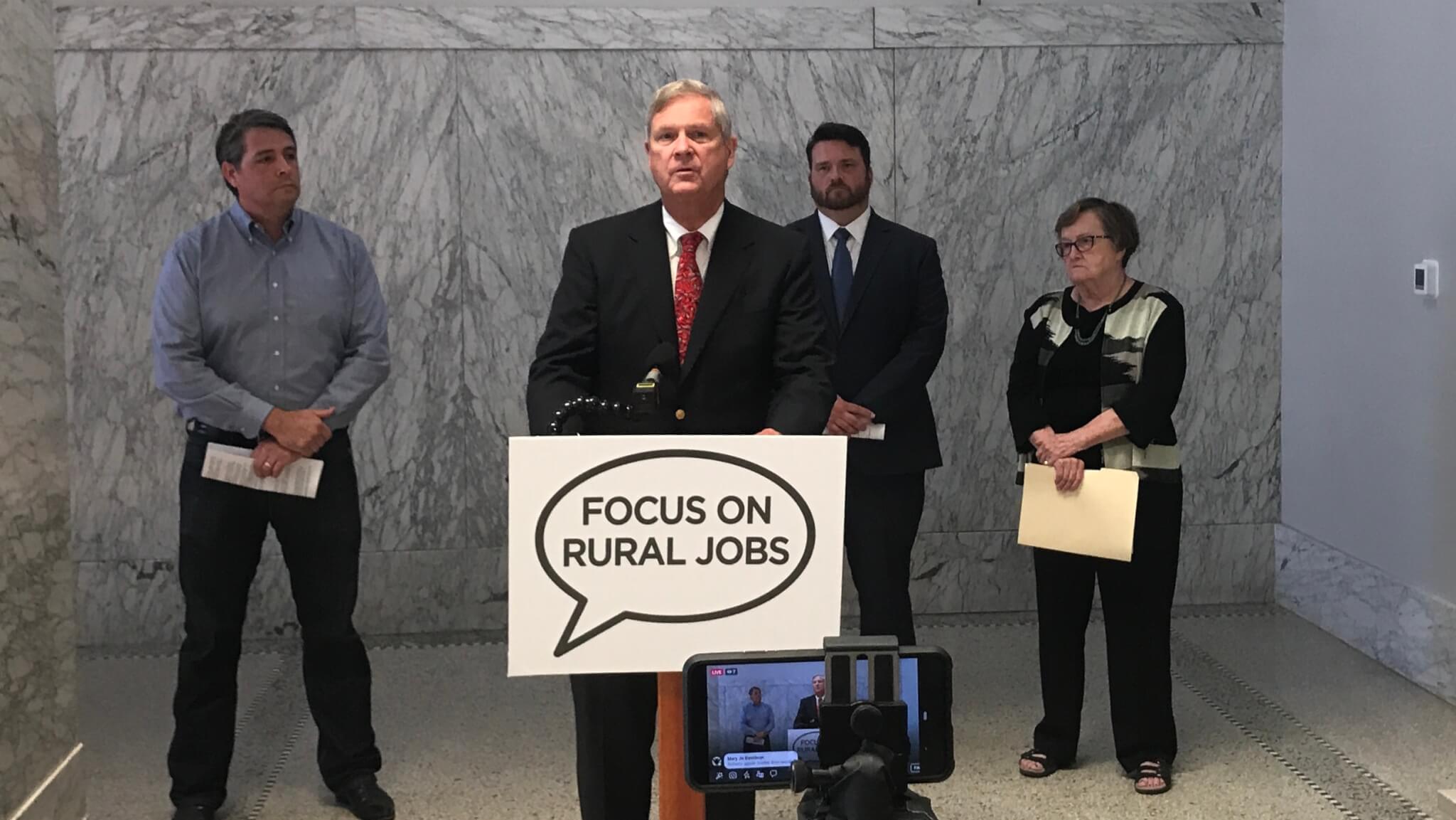
Focus on Rural America hosted a press conference Thursday to call out President Donald Trump for the promises he made to farmers and the biofuel industry during his first campaign, but has failed to live up to.
“We have a bait-and-switch. They said we’re gonna give you year-round E15 sales, but we’re gonna grant enough waivers to the oil industry that it does not result in any additional market share,” Patty Judge said.
Focus on Rural America chair and former Iowa Lt. Governor Patty Judge spoke at the press conference, along with former U.S. Secretary of Agriculture Tom Vilsack, IDP Chair Troy Price, and 2018 Iowa Secretary of Agriculture candidate Tim Gannon.
Annual Biofuel Expectations for 2020
A new annual renewable-fuel volume obligation (RVO), under the renewable fuel standard (RFS), has been released by the EPA, pushing for a marginal increase on how much biofuels refiners must blend into their gasoline mixes – from 19.92 billion gallons in 2019 up to 20.04 billion gallons in 2020.
The RVO does not, however, create new expectations for small refinery exemptions (SRE), which have drawn a lot of heat in recent months from corn farmers, ethanol producers, biofuel groups, Republican leaders and Democratic presidential candidates.
SREs have blocked billions of gallons of ethanol from being blended into fuel mixes during the Trump administration, but the new mandate also does nothing to reallocate this fuel and get it into the market.
[inline-ad id=”0″]
All of this comes following the EPA’s decision to allow the year-round sale of E15 fuel, which Trump used as a talking point in Iowa during a campaign fundraising trip.
It didn’t go as well as he expected, as some farmers grilled him with questions about the waivers, reportedly prompting him to have a sit-down with Andrew Wheeler, the head of the EPA, and Sonny Perdue, the U.S. Secretary of Agriculture, upon his return to Washington, D.C.
Focus on Rural America Press Conference
Even with year-round E15 sales, Vilsack said it would take years to make up for the ethanol already blocked from the market during Trump’s administration.
“This is an industry that literally supports hundreds of thousands of jobs, many of them are located in the Midwest, and quite a few are located in the state of Iowa,” Vilsack explained. “It’s also an industry that has helped reduce our reliance on foreign oil and it’s an industry that’s helped secure a cleaner environment. So, it’s an industry worth supporting.”
Vilsack reflected on his time as the head of the USDA building the biofuel industry, noting of the Trump Administration, “you’re either with the industry or you’re not.” Even as Trump makes the rounds on his re-election campaign, finding a middle ground between the oil industry and the biofuel industry is proving to be difficult for him.
“We can’t really wait until after the 2020 election; farmers and rural communities need help now – we can’t wait another 18 months,” said Price. “But if this administration continues down this path, waging these trade wars and doing these handouts for big oil on the backs of farmers and rural communities, then we’re going to make it a campaign issue and make sure voters know who’s standing up for them.”
Oil Industry Won’t Stop
“I’m not about to make news here, but the oil industry is not particularly supportive of the RFS,” Vilsack joked. “They have looked for every opportunity and every way to undercut the RFS … I don’t think the oil industry is going to stop, and that’s why you have to have an administration that says, ‘no, this industry is important to the country.’”
Vilsack also noted the consumer benefits of biofuels, most notably that more biofuels on the market drive down the price of regular gasoline, which large oil and gas companies are, for obvious reasons, not big fans of.
While these waivers have seen an uptick since the Trump administration, it’s not the first effort to limit biofuel production by the oil industry.
There have been efforts made through litigation, congressional requests and lobbying, and pressuring the EPA to keep the RVO stagnant, but the SREs are a path of least resistance under the current administration.
Rural Ripple-Effect
Tim Gannon noted in his remarks the tremendous stress farmers are under already with rising operating costs and shrinking margins. But how bad could it really get for farmers and rural areas?
“There’s no doubt that there’s more and more stress on folks in agriculture right now; that means farming operations, banks that lend to them, equipment dealers who sell tractors to them, seed businesses that depend on farmers doing well,” Gannon explained. “We don’t want to see another crisis situation where thousands of family farming operations are forced out of business because they can’t make a living.”
Gannon said that if this pattern continues, we’ll see further population loss leading to more stress on rural hospitals and school districts.
“Biofuels has been a great example of taking what we do so well in agriculture, producing corn and beans and other things, and adding value to it,” Gannon explained. “Those are the kinds of things we need to be encouraging so we can have more and more market opportunities for our farmers.”
by Josh Cook
Posted 7/12/19
Politics

6 terrifying things that could happen if the Comstock Act is used to target abortion
Does 1873 sound like a really, really long time ago? Well, that’s because it is—but if Republicans and far-right anti-abortion activists have their...

Iowa parents explain how ‘fetal personhood’ would harm IVF
Lyndi Buckingham-Schutt and her husband Andy Schutt, both Des Moines residents, always knew they wanted to have children. When Lyndi was 30, they...
Local News

No more Kum & Go? New owner Maverik of Utah retiring famous brand
Will Kum & Go have come and gone by next year? One new report claims that's the plan by the store's new owners. The Iowa-based convenience store...

Here’s a recap of the biggest headlines Iowa celebs made In 2023
For these famous Iowans, 2023 was a year of controversy, career highlights, and full-circle moments. Here’s how 2023 went for the following Iowans:...




